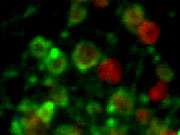Controlling the fate of cells

A protein found in cells has been shown to play a pivotal role in determining whether a cell lives or dies.
This has important implications for many human diseases as it may contribute to the development of new therapies.
Dr Jon Lane and colleagues in the University of Bristol’s Department of Biochemistry have shown for the first time that the protein Atg4D can exist in two forms. In its original form, Atg4D promotes cell survival through ‘autophagy’, a survival mechanism used by cells to overcome various environmental stresses, including starvation, and to control normal cellular processes such as growth and development
In a modified form, Atg4D can attach to the power units of the cell - the mitochondria - to stimulate cell death via ‘apoptosis’. Their research is reported in the July issue of the Journal of Cell Science.
The biological processes of autophagy and apoptosis are closely linked, and as such both play an essential role in cancer and neurodegenerative diseases such as Parkinson’s and Alzheimer’s.
Dr Lane explains: “Understanding how this protein is regulated may provide new approaches to control the fate of cells in important human diseases”.
In cancer, cells fail to undergo apoptosis, allowing them to grow uncontrollably and develop into tumours. In contrast, the activation of apoptosis in neurodegenerative diseases is detrimental, contributing to the progression of the disease. The role of autophagy in disease is less clear, however, its activation may prevent or halt the development of some neurodegenerative diseases and cancers. Clearly, the finding that Atg4D has a dual role in controlling both autophagy and apoptosis has important implications for many human diseases. It may ultimately contribute to the development of new therapies.
More information: The paper: Caspase cleavage of Atg4D stimulates GABARAP-L1 processing and triggers mitochondrial targeting and apoptosis, by Virginie M. S. Betin and Jon D. Lane. Journal of Cell Science 122 (14), 2554-2566. jcs.biologists.org/
Provided by University of Bristol (news : web)
















